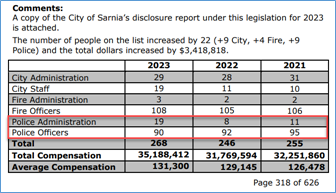
Broadcast Time: 6:30 a.m. Date: March 7th, 2024
Public Sector Salary Disclosure – Sarnia Police
Pursuant to the Public Sector Salary Disclosure Act, the City of Sarnia has now released salary information for the Sarnia Police Service. That information is contained within the March 11, 2024 Council Agenda, available online at: https://sarnia.civicweb.net/document/181950/
PSSD Summary
- The Public Sector Salary Disclosure Act, often referred to as the “Sunshine List”, was established in 1996.
- For the past 28 years, with pay variations in both public and private sectors, the 1996 threshold of $100,000 has never changed. The number of individuals on the list has consistently grown, as decades of inflationary and other changes accumulate.
- A $100,000 threshold salary in 1996 (28 years ago), is now the inflation-corrected 2023 equivalent of $174,240.
- Public Sector Salary Disclosure reports the actual base salary combined with additional paid work such as overtime and paid duties.
- A top earning 1st Class Constable (with 23 years of experience or more) earned $118,430 as a base salary in 2023. That same officer must work an additional 117 hours of overtime for every $10,000 above their base salary.
2023 SPS Salary Disclosure – If corrected for Inflation
- If the original 1996 threshold was adjusted for inflation, the 2023 Sarnia Police list would consist of only five (5) people.
- Of those five (5) people, only one (1) would be there by virtue of base salary. The rest performed significant additional work, in excess of their annual salaried working hours (i.e. overtime or paid duties), or in one case, the result of multi-year retroactive payroll adjustments.
- The SPS Chief and Deputy Chief are not eligible for any overtime pay, regardless of excess hours worked (base salary only).
Additional Information:
-
Police salaries in Ontario are contractual and negotiated between the Police Associations and the Police Services Boards. These negotiations are heavily influenced by arbitrations and current contract settlements across the province.
-
“Police Administration” numbers as reported by the City of Sarnia do not strictly reflect actual SPS “administrative” roles.

- The Sarnia Police employ a number of civilian professionals who are not police officers.
- The City-reported “Administration” category actually includes all non-officer positions (except the Chief/Deputy), not only “administrative” roles.
- For the nineteen City-reported “Police Administration” positions twelve (12) are fully operational front line 9-1-1 dispatchers. Two (2) are the Chief and Deputy Chief (police officers). The remaining five (5) are the Directors of Finance and HR, and the Managers of Fleet/Facilities, IT, and Property/Stores.
- The Sarnia Police employ a number of civilian professionals who are not police officers.
-
Overtime is often necessary and utilized to meet legislative and operational requirements when they extend beyond the capacity of available resources. It is a necessary and unavoidable part of business operations, and often the most efficient way to address short-term or exigent staffing needs. Overtime is paid to those employees who work in excess of their normally scheduled hours.
-
Paid Duties are contracts where private citizens or companies can hire a police officer at no cost to the SPS i.e. privately funded overtime.
- These extra duties include traffic points for construction, wide load commercial vehicle escorts, large community events, and other private events where on duty police officers would not otherwise be provided. https://www.sarniapolice.ca/how-do-i/hire-a-pay-duty-officer/
- Paid duty work is conducted off duty and not during an officer’s scheduled hours of work.
- These extra duties include traffic points for construction, wide load commercial vehicle escorts, large community events, and other private events where on duty police officers would not otherwise be provided. https://www.sarniapolice.ca/how-do-i/hire-a-pay-duty-officer/
